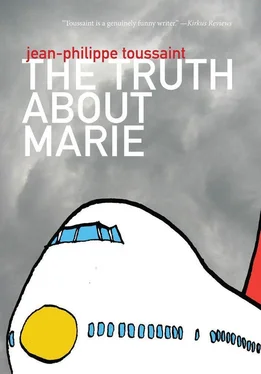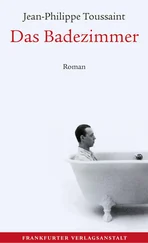As soon as Jean-Christophe de G. saw Marie enter the lobby — she was walking slowly, her course unswerving and her eyes pale in the chandelier’s light, a vacant look on her face, trailing in her wake a host of hotel employees in black livery who followed her with two golden luggage carts, a varied heap of bags piled high on each — he interrupted his improvised meeting and stood up quickly to greet her, politely offering to carry her small plastic sack of fugu sashimi. We have to leave right now, we’re late, he told her, uncertain of what he should do with the sack of fugu sashimi he now held in his hand, and Marie didn’t respond, she didn’t say anything, followed him silently, insouciantly — Marie, fixing her gaze on nothing in particular, in skirt and black boots, her long leather coat draped over her arm, its loose belt dangling and dragging on the floor behind her. A rented Japanese limousine awaited them outside the hotel (with large cream leather seats, small embroidered coverings over the headrests, and an adjustable armrest with electronic buttons inscribed with the word MAJESTA), and several hotel employees assisted in unloading Marie’s many and disparate bags, placing them in the trunk and front seat of the limousine, while the four Japanese men in navy-blue pocket-crested blazers gathered their belongings and got into a small minibus parked nearby, its doors bearing some sort of golden insignia. There were so many bags on the luggage carts that the employees had to load some in the minibus. Sitting shoulder to shoulder in their narrow seats, impassive among a growing mass of beribboned boxes, designer handbags, tiny frilled sleeves for small precious items, the four Japanese men watched as the bellhops continued to place bags by their sides. Perhaps they were lawyers or jurists, or members of a Japanese horse-racing society, one of them had his hair dyed and sported a pocket handkerchief of bright mauve, which spilled elegantly out of his chest pocket (the sign of an artist, bohemian, veterinarian?).
The convoy began on its way, slowly winding down the hotel’s private access road, the small minibus leading the pack, followed by the limousine and the imposing aluminum horse trailer, which struggled around the bends and made wide turns with infinite precaution. They drove on for a quarter mile without any difficulties, enough time to leave Shinjuku’s administrative center behind them, before speeding onto the freeway in the direction of Narita. But, almost right away, they were caught in traffic. They crept along, stopping and starting in traffic, before being stopped for a longer period in the evening’s gray drizzle. Through the foggy rear window, Marie saw the aluminum trailer’s monumental silhouette, its powerful headlights piercing through the rain in the day’s waning light — the trailer at a near stop, majestic, rocking slightly on the wet pavement, its tires and axles creaking. Marie looked at the trailer immobile behind her in the rain, this immense and incongruous vehicle, dark and mysterious, run aground in the Tokyo traffic, with its two barred windows on each side, behind which reigned the living presence, quivering, hot, of an invisible thoroughbred.
Jean-Christophe de G. hadn’t taken off his coat, hadn’t even removed his scarf. Sitting back in his seat, separated from Marie by a large adjustable armrest, he made call after call, speaking to various people in English, his knee shaking steadily, frantically tapping the ground in time with his foot, then, hanging up — without however putting the phone away, already poised to dial another number — flashing a tense smile at Marie and tenderly touching her bare arm, unconvincingly, almost mechanically, his leg still twitching nervously, uncontrollably. Jean-Christophe de G. knew the customs office at the cargo zone at Narita closed at seven and there would be no possibility of extending their hours (theirs were inflexible hours, Japanese hours), arriving late wasn’t an option, the slightest derogation of policy was out of question. In other words, either they get the horse to the airport before seven and board the plane, or they arrive late and the horse remains stuck in customs in the cargo zone of Narita Airport with all the attendant consequences.
Jean-Christophe de G. knew the horse’s papers were in order, its vaccinations records updated, its permission for transport validated, but he feared a final complication with customs, some required document of which he was perhaps unaware, and, all while sharing his concerns with Marie, he dialed more numbers on his phone. In fact — and Marie only realized this at the present moment — the people with whom he’d been speaking one after another since they’d left the hotel were none other than the four Japanese men just ahead of them in the minibus. He spoke with them without interruption, not with one of them in particular, a sort of designated spokesman, but with all four alternately, depending on the question at hand or the specialization of each, their phones rung or vibrated incessantly in the small minibus, forcing them to answer in turn, striving to reassure Jean-Christophe de G. with the same few words incessantly repeated, always agreeing, never saying no, favoring an ambiguous or oxymoronic yes ( yes, I don’t know ), which only alarmed him even more.
Traffic had cleared, the rain had picked up violently and was now accompanied by gusts of raging wind, whose assaults rocked the metal body of the trailer as it sped down the freeway. Narita Airport was in sight, indicators of its imminent approach thronged the freeway, on one side the Narita Hilton, on the other a giant billboard with an ANA advertisement glowing in the rain and night. The airport itself was surrounded by a double row of metal fencing topped with barbed wire, behind which stretched a vast, deserted space, the dark and mysterious extremities of the airport. The convoy slowed down as it approached the airport and moved into one of the lanes of the police checkpoint. Several police officers wearing transparent jackets directed traffic in the rain in front of a large gate, similar to those of highway tollbooths, waving vehicles forward with fluorescent batons. One officer stepped into the minibus to quickly check the passports of the Japanese men, which they had out and ready, and he wasted no time, pointing at each passport as he passed down the aisle before getting out of the vehicle, while another officer stepped out of a kiosk and walked over to the limousine. Jean-Christophe de G. rolled down the automatic window with an electronic button on the armrest and handed the officer his passport in the night, as well as the horse’s passport, because the horse had a passport too, a personal ID, official, coated in plastic, impossible to forge (with picture, birth date, and pedigree). The officer opened Jean-Christophe de G.’s passport, looked at his picture, and returned it to him, then he opened the horse’s passport and leaned into the car to take a quick look at Marie’s face (but, even in the dark, it was impossible to confuse Marie with a horse). Jean-Christophe de G., realizing the misunderstanding, asked Marie — Marie, aloof, distracted — to please show the officer her passport. But Marie could never find her passport when she needed it, and, suddenly roused from her reverie, as if caught off guard, her face already betraying the tiresome futility of the search to come, she was overcome by a mad frenzy, that strange mix of panic and goodwill she displays when looking for something, desperately digging through her purse, turning and shaking it in every which way, taking out credit cards, letters, bills, her phone, dropping her sunglasses on the ground, trying to stand in the limousine and twisting around to check her skirt’s back pocket, the pockets of her leather coat, of her sweater, positive she had it with her, that damn passport, but not knowing in which pocket she’d put it, in which bag it could possibly be, twenty-three bags exactly (without counting the plastic sack with the fugu sashimi, in which she also glanced just to be sure) — all in vain, the passport was nowhere to be found. She had to get out of the limousine — Jean-Christophe de G. kept his cool, telling her not to worry in a calm tone, checking his watch in a panic — and she opened the trunk in the rain, took out her bags, and dug through them on the wet ground, under the officer’s cold, indifferent gaze. I must have left it at the hotel, Marie said, and she said this without the slightest trace of concern, almost with excitement, as though to imagine the worse — being at a security checkpoint in Narita without her passport — thrilled her, intoxicated her even, already aware of how funny this would all be in hindsight. This whimsy, this lightness of being, this ravishing insouciance, enchanting and radiant, a clear display of Marie’s charm at its best, was delightful as long as one wasn’t directly involved. Jean-Christophe de G., for his part deeply involved at the moment, grabbed her firmly by the arms (his gallantry beginning to crack), and he asked her to think about where she’d put her passport. I have no idea, Marie told him — he was beginning to annoy her now with all his questions — and she suggested it might be in her leather suitcase with her plane ticket. She took out this suitcase from the trunk and found her passport immediately, which she presented to the officer, who hardly looked at it before approving (after all, it was only a routine security check for people entering the airport).
Читать дальше












